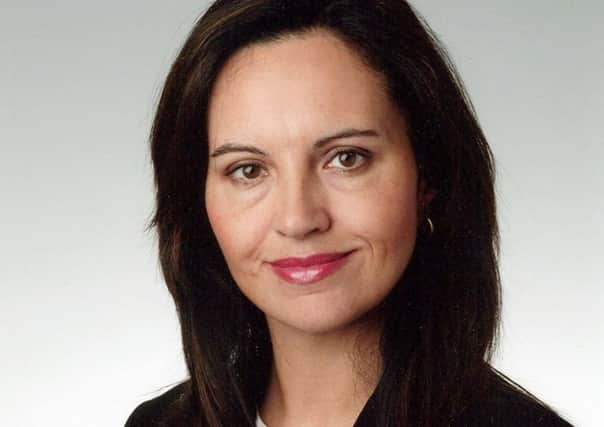Caroline Flint: I was lucky. During the time alcohol took hold of my mum's life, the alcohol did not result in violence at home.


MPs usually joust with the Prime Minister – the party knockabout we see most weeks at Prime Minister’s Questions. This time, I wanted to ask her support for the first ever Manifesto for Children of Alcoholics.
Some issues go beyond the usual party lines, and this is one of them.
Advertisement
Hide AdAdvertisement
Hide AdIn 2015, my colleague Liam Byrne, MP for Birmingham Hodge Hill, spoke movingly of his father’s final years as an alcoholic. Liam knew my story and we decided to set up an All Party Parliamentary Group. There was already one on alcohol, but we wanted one that gave voice to the families, in particular, children.
During the Labour government, programmes to support alcohol misusers became well-established. But the problem our research has highlighted is that one third of local authorities have been reducing budgets for drug and substance abuse, including alcohol services. At the same time, hospital admissions for alcohol-related problems are rising.
Not one of the 138 local authorities who responded to a survey, had a plan to support children in families with an adult who is a hazardous drinker.
This has to change.
Last week, the All Party Group brought together dozens of ‘survivors’ – supporters of the National Association of Children of Alcoholics, who run a helpline for children. Many of those volunteers have similar experiences to mine; and some much worse.
Advertisement
Hide AdAdvertisement
Hide AdI was lucky. During the time alcohol took hold of my mum’s life, the alcohol did not result in violence at home. Many families report the opposite. Indeed, my mum worked for years while an alcoholic. She was popular. She had friends. But I always knew when she was drunk, even if others couldn’t tell.
They testified to how alcohol changes a parent; how children feel shame and avoid bringing friends home from school, uncertain what they face when they get there. They report families impoverished by an adult’s spending on alcohol. They also described loving that parent and hating them all on one day. And children, forced to become proxy carers for their younger siblings, because they can’t rely on mum or dad.
I recall so many of those experiences.
One thing all agreed was that the impact on children lasts for decades.
Both school and, later, university were an escape for me. I loved school and I had some great teachers during my teens. In the end, during the difficult years, I lived away from home twice; once during my O-Levels; and once to prepare for my A-Levels – the second time with the help of a grant from a charity.
Advertisement
Hide AdAdvertisement
Hide AdUniversity was an escape. It changed my life. I worried about my younger siblings; volunteering at the student Nightline, in the days before mobile phones, my sister could keep in touch via their landline.
Not every child has someone to turn to. Last week, a national newspaper reported a child rang the NACOA helpline at Christmas to ask if someone would read a bedtime story, because mum and dad were too drunk.
This child, and millions more, are twice as likely to struggle at school, often without anyone knowing what is happening at home.
They are three times more likely to consider suicide, four times more likely to become an alcoholic themselves, and five times more likely to develop an eating disorder.
Advertisement
Hide AdAdvertisement
Hide AdThe problems of a parent hooked on booze can cascade down the generations.
I have seen for myself the help being offered for alcohol misusers, when I visited the Doncaster Royal Infirmary a few weeks ago. The consultant reported that half of the patients presenting with liver disease, and other ailments linked to alcohol abuse, chose cheap cider as their drink.
Half of them! I was staggered, but a litre of 7.5 per cent cider has just 39p duty added. The same strength beer would attract 138p of duty. So for £3 an addict can buy three litres. Today, alcohol is 45 per cent cheaper than in the 1980s.
Part of any strategy to support the children must be to tackle easy access to cheap booze, which allows an adult to become wasted for just a few pounds.
Advertisement
Hide AdAdvertisement
Hide AdThanks to Liam Byrne’s efforts in working with charities and families who are affected, we launched a Manifesto for Change, which is rooted in the real experiences of many British children.
The Manifesto is just a first step, the embryo of what needs to become a Government-led strategy to support and listen to children of alcoholics.
It must begin by Government accepting responsibility to lead the effort. This is the only way we will see comprehensive support put in place; the only way those working with children will be trained to spot the signs; the only way properly funded helplines will be established.
In a thoughtful response to my question, the Prime Minister promised to look closely at the ideas we have presented. I am optimistic.
Advertisement
Hide AdAdvertisement
Hide AdMy story is not unique, or heroic. It was a childhood mirrored by millions. Liam Byrne and I want this to be the first generation who get the support they need.
My mum Wendy would have been amazed and proud that her daughter became an MP. We want millions more children to have happy endings to their story.
Caroline Flint is the Labour MP for Don Valley.
If you would like to talk to someone, please call Nacoa’s free, confidential helpline 0800 358 3456, email [email protected] or write to Nacoa, PO Box 64, Bristol, BS16 2UH.